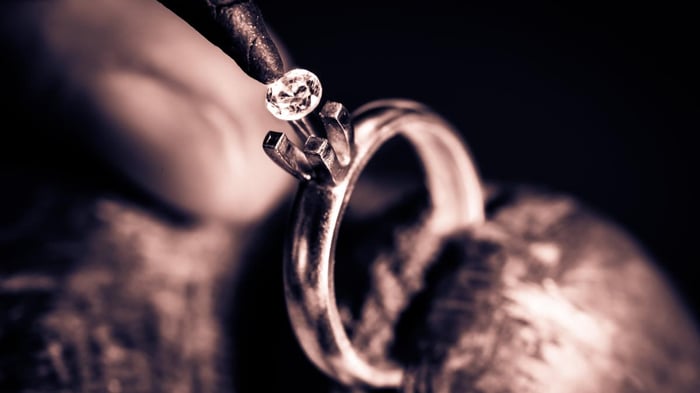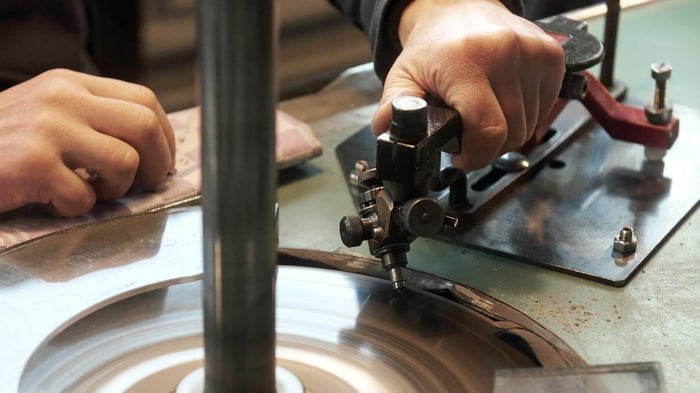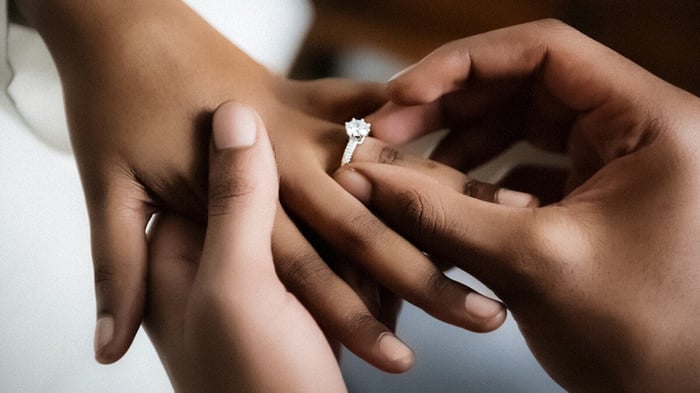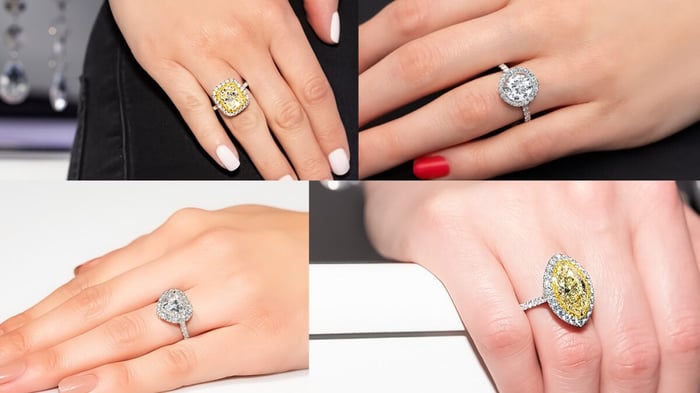Have You Ever Wondered How Diamond Rings Are Made?
Just one look at a diamond engagement or eternity ring reveals a vast amount of intricate artistry, skill, and work that goes into making a diamond ring. A piece of fine diamond jewellery is made up of delicate materials and tiny parts that must all fit seamlessly together yet be strong enough to withstand a lifetime of wear on the hands. So, let us discover how diamond rings are made.
Modern jewellery is a blend of high-tech tools and traditional handcrafting skills that enable diamond jewellery specialists such as All Diamond to offer stunning designs that are practical and affordable. There has never been a better time to buy and own fine diamond jewellery.
0.25ct Ruby 0.12ct Diamond Five Stone Ring 18k White Gold
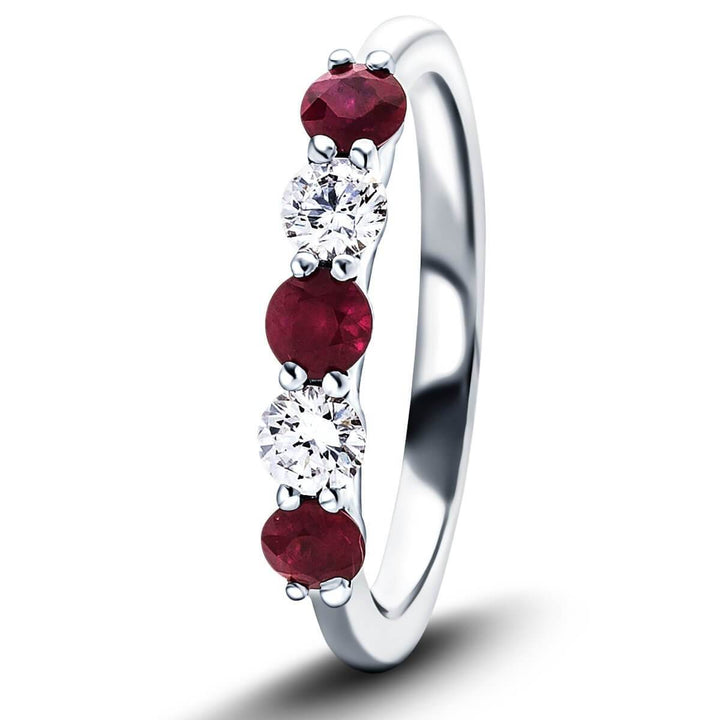
$821.00
$1,083.00
This modern ring is an easy way to add an elegant finishing touch to any outfit. The 18 karat gold finish is less likely to cause an allergic reaction because it has a high gold content. The attractive round-cut stone… read more
While this article covers diamond rings, most of the information is relevant to all the other types of diamond jewellery that we offer.
Of course, a diamond ring does not start with the jeweller working with diamonds and precious metals. The process begins well before that with our British designers who use their imagination to blend precious metals and gems into forms that excite and please us.
Creating The Design Of The Ring
Every price of diamond jewellery starts life as a drawing on a piece of paper, or more often these days, a 3-model on a computer display. Designers use computer-aided design (CAD) to turn their imaginations into life. The design is refined to make it practical to manufacture both in terms of durability and price.
The use of CAD has sped up the design process, meaning that new trends can be identified and brought to eager jewellery buyers much faster than before and with a much wider choice of designs than was possible just 20 or 30 years ago.
Making A Wax Model And Casting The Ring
When the ring's design has been finalised, it is time to create wax models of the ring. Usually, there will be several models, each reflecting a different ring size. A craftsman carves wax into the shape of the ring, making an exact replica of the design image.
Next, the various wax models are placed into a single unit called a 'wax tree'. This enables many ring variants to be cast together in a single process, allowing higher quality casting at a lower cost.
Now, moulds will be created using plaster. The moulds will enable the craftspeople to cast gold, platinum, or other precious metals into the basic shape of the final ring. The wax tree is placed into a form into which liquid plaster is poured. The plaster is then baked in a furnace, which causes the wax to evaporate away, leaving a cavity into which precious metal can be poured, creating the ring shape.
To create the metal rings, precious metal is melted at extremely high temperatures and then drawn into the plaster mould using a vacuum to draw the liquid metal into the smallest gaps and spaces. As the metal cools and solidifies, the ring shape is created, ready for the next stage. When the metal has solidified, and the plaster cooled enough, the plaster is carefully broken, revealing a tree of rings ready to be separated for the next stage of the manufacturing process.
11 Stone Half Eternity Ring 0.75ct G/SI Diamonds in Platinum
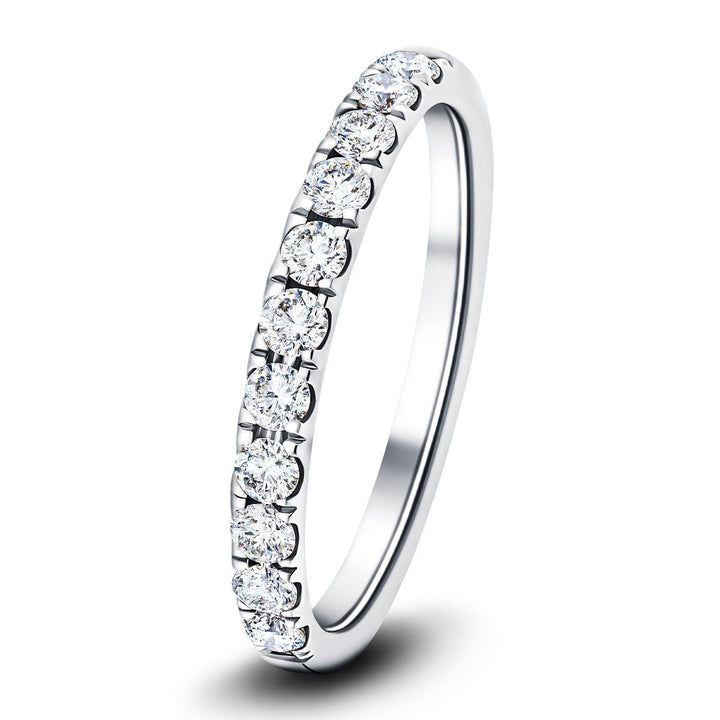
$1,784.00
$3,131.00
This stunning half eternity ring has a subtle yet unique design that makes it the perfect choice for a special occasion. This beautiful ring is perfect for everyday wear as well. The timeless design is elegant and comfortable. The natural… read more
This process of using wax models cast into plaster is called the lost-wax process, as it describes how the wax is lost from the plaster at high temperature. This process has been used for many hundreds of years.
Sizing The Ring
When the castings are cool enough to work on, they are separated from each other. The rings are now sized using a mixture of heat and hammering to make the ring into one of the standard sizes so that buyers can reliably choose a ring that will fit their finger. Once the correct size is reached, the ring is filed using an abrasive rubber wheel to remove any surplus 'flash' metal.
Pre-Polishing A Diamond Ring
During the pre-polishing process, a series of increasingly fine abrasives are used to bring the precious metal to a high shine. At the end of the pre-polishing, the ring will be ready to be set with diamonds and other precious gems.

Setting Diamonds Into The Ring
Before the diamonds are set into the ring, they are carefully selected, measured, and matched for size, colour and quality.
The setting type is a part of the design of the ring. The designer will have considered two factors:
1)The security of the diamond on the ring – nobody wants to lose a diamond.
2)The way that light passes through the diamond to create the sparkling light show.
There are many types of setting, the most popular being the prong or claw setting, where 4 or 6 prongs rise from the band and fold over the diamond. This style gives good security and allows the greatest possible amount of light to enter the ring and be reflected from the sides and top.
For jewellery that may be subject to knocks and impacts, a rub over setting where the metal of the ring is pushed over the girdle of the diamond to hold it very securely will be used. This style gives less sparkle but can be extremely attractive in its own right.
Final Polishing
When all the diamonds have been added to the ring, it is given its final polish. It is at this stage that the precious metal will develop its deep lustre. At this stage, white gold rings are given a plating of rhodium to protect against scratching and enhance the whiteness of the gold.
Final Quality Control
Throughout the entire process, our artisans work to high standards. Their work is checked at every stage; however, before the ring can be delivered to the customer, it must go through a final quality check under bright lights and 10x magnification. Any fine scratches or blemishes can then be rectified, giving a 100% perfect product. Our attention to detail is how we can offer a lifetime guarantee of materials and workmanship on all our diamond jewellery.
18k Yellow Gold 1.00ct G/SI Diamond Three Stone Bezel Set Ring
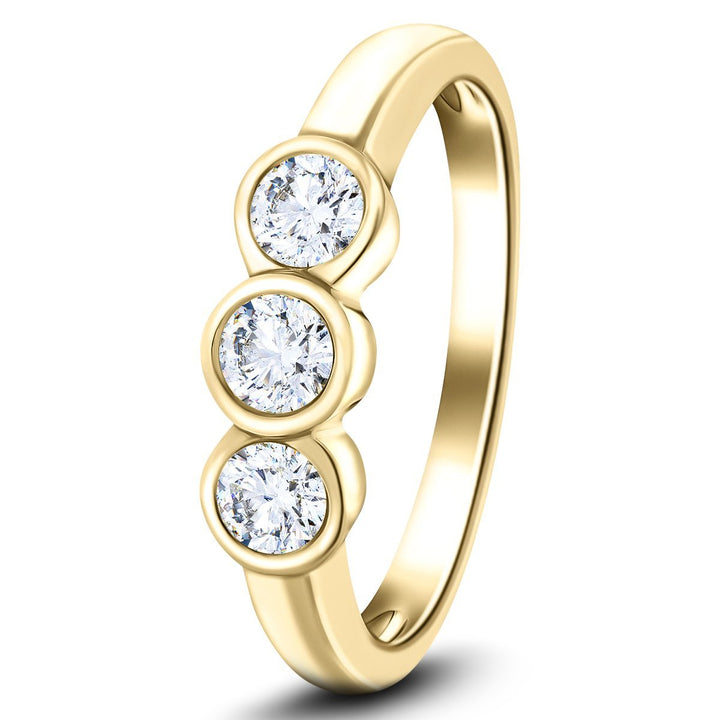
$3,502.00
$6,266.00
This three stones ring is a stylish way to add a touch of modern flair to your look. This ring is the ideal choice for formal occasions. A stylish and subtle look with a simple three-stone design and classic diamond… read more
Now that you know the basics of how diamond rings are made, we hope that you understand the skill and effort that makes fine diamond jewellery possible. All our diamond jewellery is hand made and finished. We can even carry out custom designs for you. Discover our extensive collections of diamond jewellery. We want to inspire you with our designs and craftsmanship.
